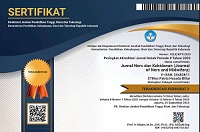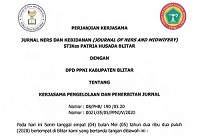Literature Review: Quality of Life in Patients with Overactive Bladder
DOI:
https://doi.org/10.26699/jnk.v9i1.ART.p127-134Keywords:
incontinence, overactive bladder, quality of lifeAbstract
Overactive Bladder, hereinafter referred to as OAB, is a complaint of urgency accompanied by urgency incontinence or without urgency incontinence, which is usually followed by an increase in urinary frequency during the day and nocturia, without infection or other pathology of the bladder. OAB can affect the quality of life of sufferers. This study analyzes the relationship between OAB and quality of life based on databases such as Science Direct, Elsevier, Willey Library, Sage Journal, and Google Scholar, 2010-2020. The study results show that the prevalence of OAB in men and women increases with age and women are at greater risk major have OAB. The incidence of OAB is most experienced at the age of > 60 years. Based on 10 journals, 6 journals stated that there was a relationship between OAB and quality of life. The conclusion of this study is that OAB can reduce the quality of life in men and womenReferences
Coyne, K. S. (2011). The impact of overactive bladder on mental health, work productivity and health-related quality of life in the UK and Sweden: results from EpiLUTS. BJU International, 108(9), 1459–1471. https://doi.org/https://doi.org/10.1111/j.1464-410X.2010.10013.x
Derek, H, T., Danielle , C, C., Kristin, M, K., Piercy, J., Patel, V., Globe, D., & Ginsberg, D. (2014). Impact of urinary incontinence on healthcare resource utilization, health-related quality of life and productivity in patients with overactive bladder. BJU International, 113(3), 484–491. https://doi.org/https://doi.org/10.1111/bju.12505
E Martinez, A., J R, C., L G, P., & P, R. (2010). Impact of urinary incontinence and overactive bladder syndrome on health-related quality of life of working middle-aged patients and institutionalized elderly patients. Actas Urológicas Españolas (English Edition), 34(3), 242–250. https://doi.org/https://doi.org/10.1016/S2173-5786(10)70056-1
Ellsworth, & Pamela. (2010). About Overactive Bladder. Jones and Bartlet.
Groenendijk, I. M., Scheepe, J. R., Noordhoff, T. C., & Blok, B. F. M. (2019). The validation of the Dutch OAB-q SF: An overactive bladder symptom bother and health-related quality of life short-form questionnaire. Neurology and Urodynamics, 38(6), 1775–1782. https://doi.org/https://doi.org/10.1002/nau.24074
Hongkong, A. U. (2019). Selamat Tinggal Inkontinensia Urin. 1–9. https://www21.ha.org.hk/smartpatient/EM/MediaLibraries/SPW/SPWMedia/Indonesian-Female-Urinary-Incontinence.pdf?ext=.pdf
Ismy, J. (2017). Penatalaksanaan Over Active Bladder (OAB). Unsyiah Conferences. http://conference.unsyiah.ac.id/ASUp/II/paper/view/707
Lloyd, S., Crawford, G., McSkimming, P., Grifi, M., Greenwell, T., & Ockrim, J. (2017). The impact of age, gender and severity of overactive bladder wet on quality of life, productivity, treatment patterns and satisfaction. Journal of Clinical Urology, 10(6), 1–10. https://doi.org/https://doi.org/10.1177%2F2051415817710111
Nursalam. (2013). Metodelogi Penelitian Ilmu Keperawatan. Salemba Medika.
Pande, M.W, T., & Harrina, E, R. (2015). A survey on the management of overactive bladder by Indonesian urologists. Medical Journal Of Indonesia, 24(2), 91–96. https://doi.org/https://doi.org/10.13181/mji.v24i2.1172
Sadly, S. (2010). Berbeda tetapi Setara. Kompas Media Nusantara.
Sexton, C. C., Coyne, K. S., Thompson, C., Bavendam, T., Chen, C.-I., & Markland, A. (2011). Prevalence and Effect on Health-Related Quality of Life of Overactive Bladder in Older Americans: Results from the Epidemiology of Lower Urinary Tract Symptoms Study. Journal of the American Geriatrics Society, 59(8), 1465–1470. https://doi.org/https://doi.org/10.1111/j.1532-5415.2011.03492.x
Susanto. (2013). Perawatan Klien Kusta di Komunitas. Trans Info Media.
Sut, H. K., Kaplan, P. B., Sut, N., & Tekbas, S. (2012). The assessment of quality of life in female Turkish patients with overactive bladder. International Journal Of Nursing Practice, 18(1), 20–27. https://doi.org/https://doi.org/10.1111/j.1440-172X.2011.01983.x
Tamtomo, D. G. (2016). Perubahan Anatomik Organ Tubuh Pada Penuaan. Library UNS. https://library.uns.ac.id/perubahan-anatomik-organ-tubuh-pada-penuaan/
Yuliang, W., Kexin, Xu, M. ., Hao, H., Xiaopeng, Z., Xiaopeng, W., Yaqun, N., & Xiaoping, K. (2011). Prevalence, risk factors, and impact on health related quality of life of overactive bladder in China. Neurology and Urodynamics, 30(8), 1448–1455. https://doi.org/https://doi.org/10.1002/nau.21072
Downloads
Published
How to Cite
Issue
Section
License
Copyright (c) 2022 Jurnal Ners dan Kebidanan (Journal of Ners and Midwifery)

This work is licensed under a Creative Commons Attribution-ShareAlike 4.0 International License.






